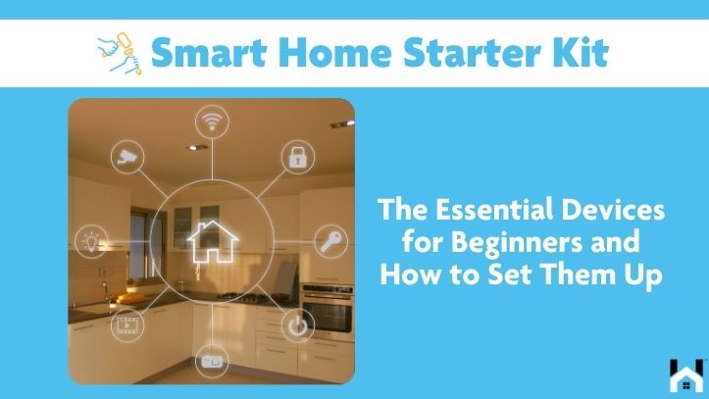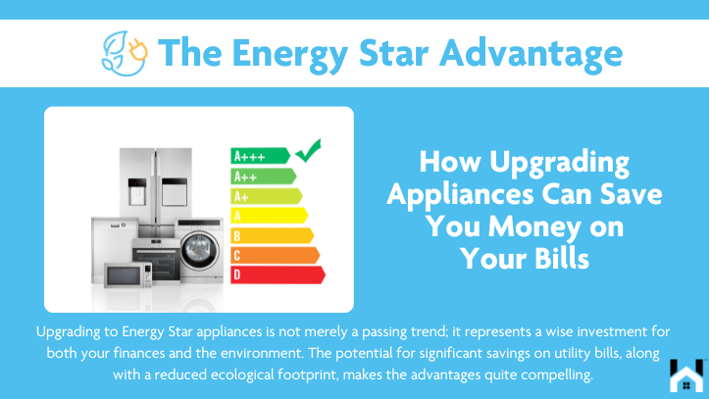Smart fridges are transforming the way individuals engage with their kitchens, seamlessly integrating smart technology and daily convenience, enhancing the modern kitchen experience.
This article will explore their remarkable features, such as connectivity and inventory management. Additionally, it will discuss the benefits they provide, ranging from efficiency to user-friendliness, while also considering potential drawbacks, including privacy concerns and initial costs.
Is a smart fridge the right choice for you? Continue reading to evaluate the pros and cons.
Explanation of What a Smart Fridge is
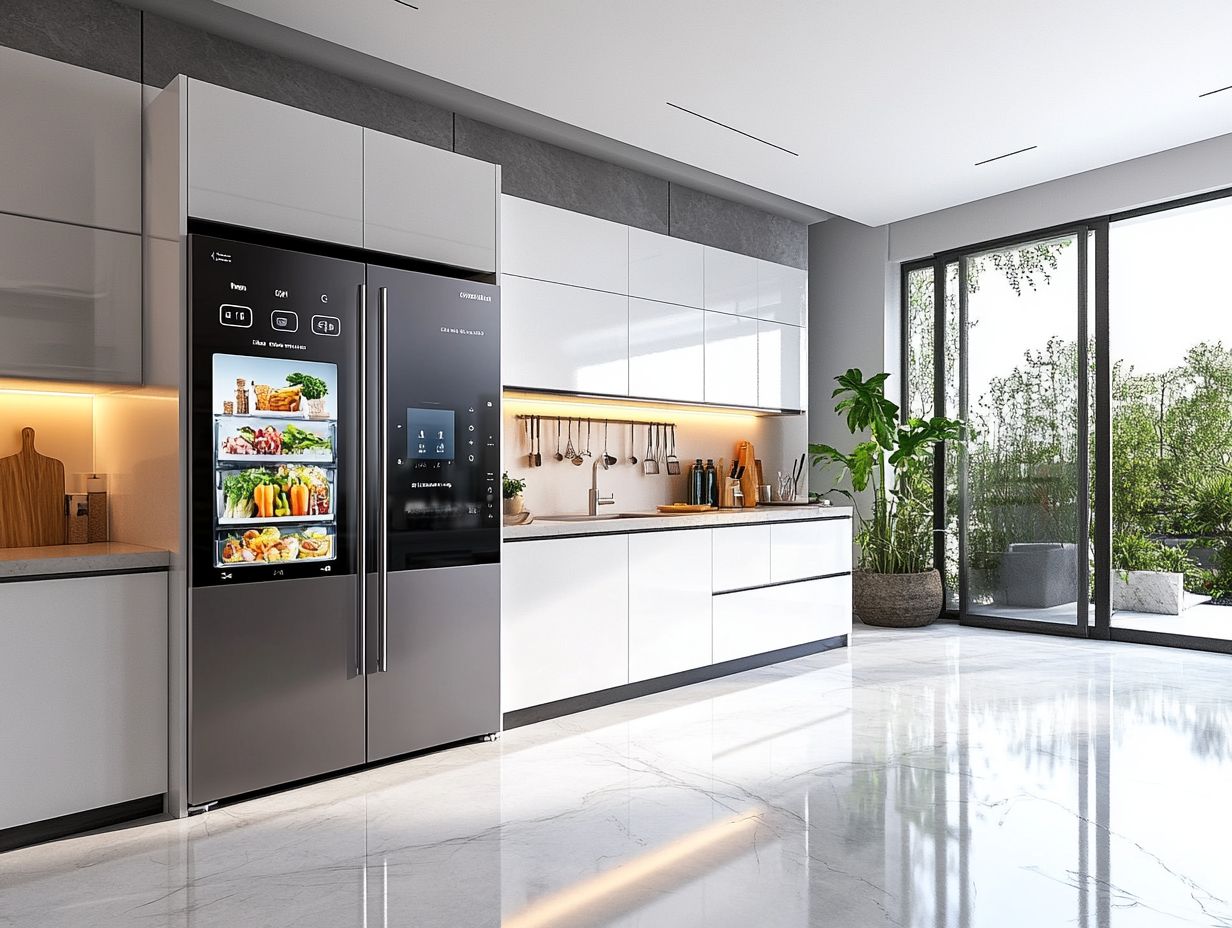
A smart fridge, also referred to as a smart refrigerator, is an advanced consumer electronic device that combines various technologies to enhance kitchen efficiency and improve food management. These appliances are designed to optimize food preservation, offer customizable settings, and include connectivity features that enable users to manage their groceries and meal planning remotely. The design often emphasizes energy efficiency and includes durable components to extend the lifespan of the appliance.
With Wi-Fi capabilities, touchscreen displays, and smart sensors, smart fridges are leading the way into a new era of home automation. These features not only improve connectivity but also offer remote access and voice commands for enhanced user experience.
In contrast to traditional refrigerators, which primarily focus on preserving food, smart fridges enhance the user experience by offering features such as recipe suggestions, inventory tracking, and expiration alerts. This functionality makes them invaluable in contemporary kitchens. Not only does this convenience simplify grocery shopping, but it also encourages healthier eating habits by helping users keep track of perishable items. The integration of smart assistants can further aid in meal planning and grocery management.
Within the broader framework of smart homes, these fridges interact seamlessly with other smart devices, creating a cohesive and efficient living environment that emphasizes ease of use and health benefits. Ultimately, they are redefining how households manage their culinary needs and food preservation through continuous innovation.
Features of Smart Fridges
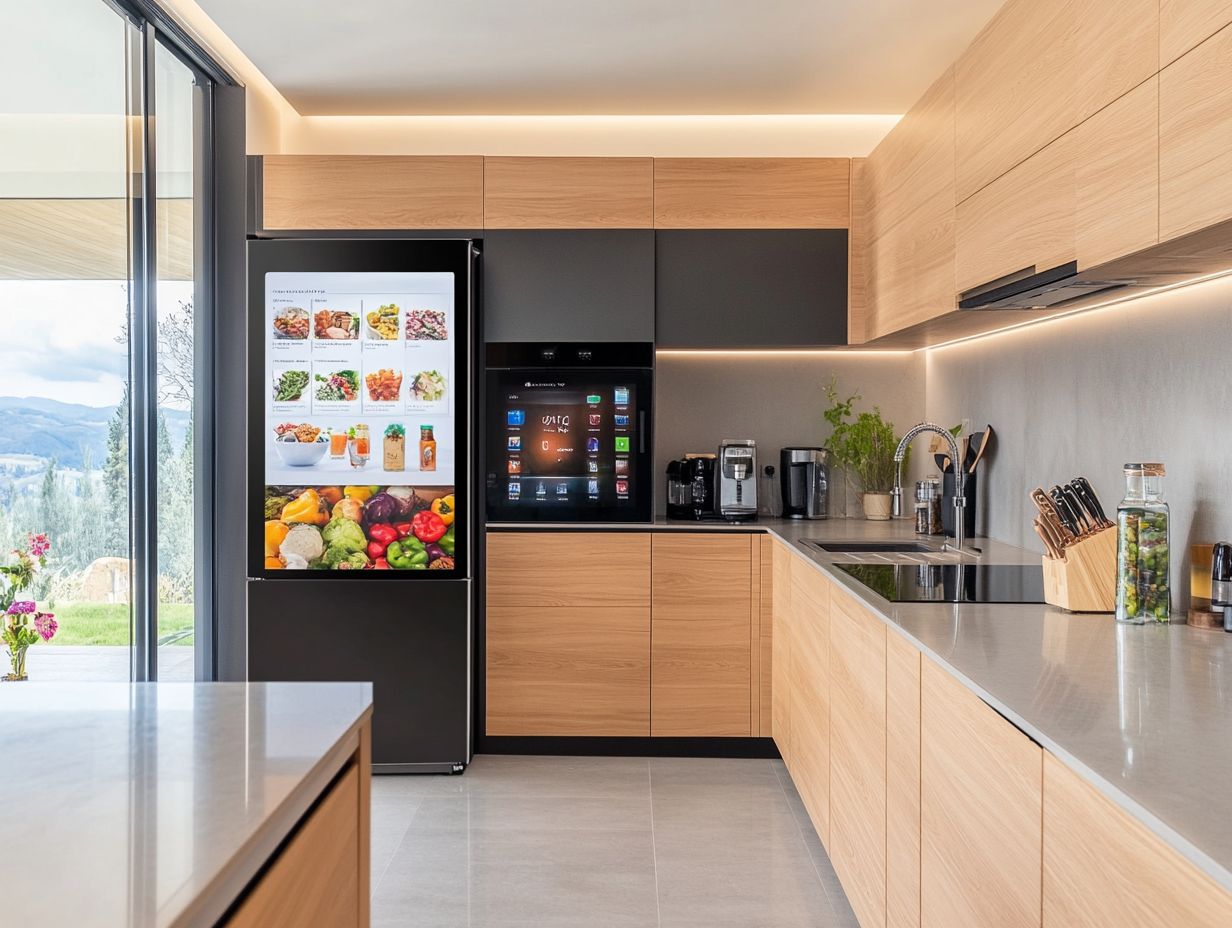
Smart fridges are equipped with a range of innovative features that enhance their functionality and improve the user experience, making them a valuable addition to modern kitchens. Their advanced design also offers significant savings through energy efficiency and reduced energy consumption.
With energy-efficient designs and advanced temperature control, these appliances offer various capabilities, including grocery management through inventory tracking, voice assistant integration for hands-free operation, and smart notifications for food expiration dates and shopping lists. Energy-saving modes are also available to further enhance cost-effectiveness and environmental impact.
Overview of Key Features
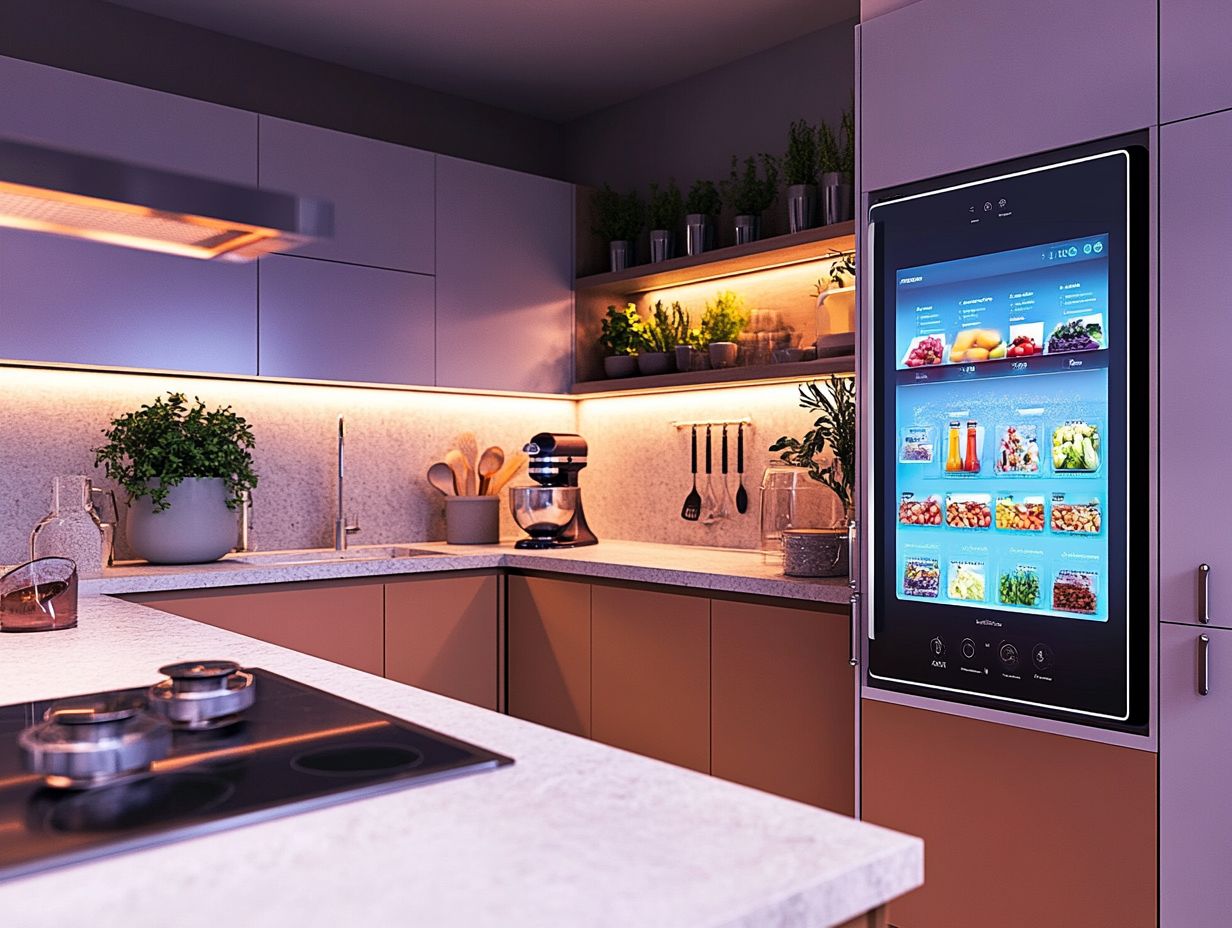
Key features of smart fridges include temperature control, which ensures that food remains optimally preserved, and grocery management systems that help users keep track of their inventory. Additionally, smart alerts notify users about food expiration dates, ensuring nothing goes to waste. Many smart refrigerators also offer app compatibility, allowing for remote management and meal planning directly from a smartphone. The user interface is designed to be user-friendly, enhancing overall functionality and user satisfaction.
To enhance user engagement, these advanced appliances frequently come equipped with touch screens that display recipes, shopping lists, and even digital calendars, making meal planning a more seamless experience. Customization options allow users to tailor the smart controls to their specific needs, including space-saving configurations and adjusting storage capacity.
Customization options are available, enabling users to adjust shelves and compartments according to their specific needs, whether that means accommodating larger items or organizing groceries more efficiently.
Connectivity issues are minimized through robust Wi-Fi integration, which ensures that updates and notifications are received promptly. This allows users to know when to restock items or adjust settings remotely, ultimately streamlining kitchen tasks and helping to reduce food waste. Additionally, the inclusion of smart notifications and alerts further enhances the convenience offered by these appliances.
Benefits of Smart Fridges
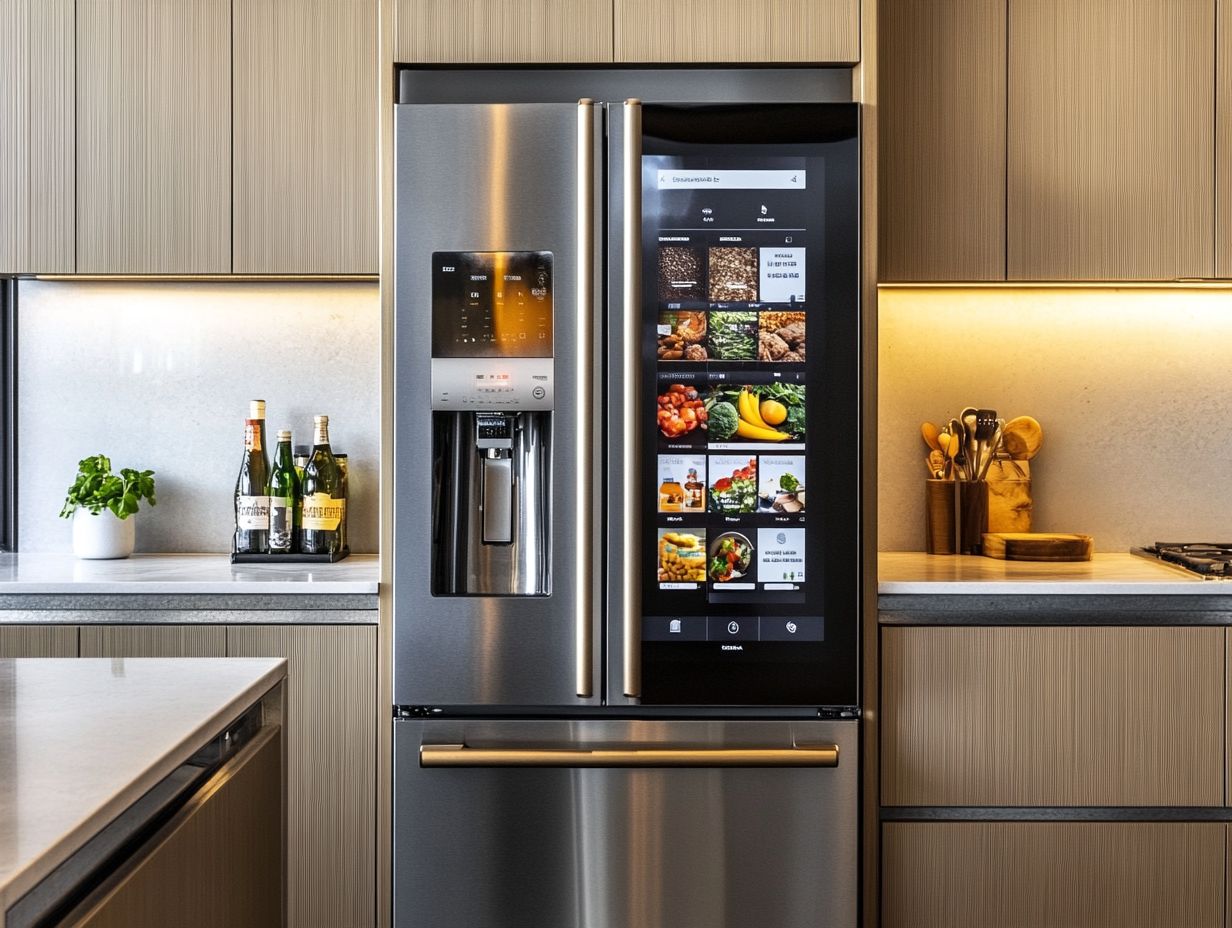
The benefits of smart fridges are quite extensive, offering significant convenience in grocery management along with enhanced energy efficiency that can lead to cost savings. The smart appliances also offer compatibility with various smart home systems, adding to their overall value and user satisfaction.
By incorporating features like meal tracking, recipe suggestions, and smart home integration, these appliances not only streamline everyday tasks but also promote healthier eating habits through improved food preservation and organization. The advanced sensors used in these systems enhance the accuracy of food tracking, further facilitating efficient grocery management.
Convenience and Efficiency
Smart fridges offer remarkable convenience and efficiency, making them an essential part of a modern kitchen. With features designed for automated grocery management, users can save significant time on meal planning and benefit from a more organized food storage system, all while effectively reducing food waste through accurate inventory tracking. These appliances also support smart cooking by suggesting gourmet recipes tailored to available ingredients.
These appliances seamlessly connect with other smart home devices, enhancing the overall lifestyle experience. This integration allows individuals to focus on what truly matters—enjoying meals with family and friends. Users find satisfaction in knowing their fridges can suggest recipes based on available ingredients and automatically generate shopping lists tailored to their dietary preferences. The compatibility with smart assistants further simplifies everyday tasks and enhances the overall user experience.
With this level of integration, last-minute trips to the store or forgotten items become a thing of the past. Instead, the technology operates quietly in the background, adapting to individual needs and preferences, thereby creating a smooth and enjoyable culinary experience. This integration is increasingly favored in market trends, reflecting growing consumer preferences for automated and efficient kitchen gadgets.
Drawbacks of Smart Fridges
Smart fridges certainly bring a range of advantages, but they also come with some drawbacks that potential buyers should take into account. Issues such as maintenance, durability, and troubleshooting can be concerns for some users, and these factors need to be considered when making an investment.
One significant concern is privacy. The connectivity features that make these fridges so appealing can sometimes lead to security risks due to data transmission. Moreover, the initial costs can be quite a bit higher compared to traditional refrigerators. It's also worth noting that connectivity issues may disrupt the performance of the smart features, which can be frustrating for users. The price range of these appliances can vary significantly, influencing consumer preferences and purchase decisions.
Potential Privacy Concerns
Potential privacy concerns surrounding smart fridges often pertain to the data collected by smart sensors and connectivity features that connect the fridge to the internet. Consumers may find themselves worried about unauthorized access to their personal information or the susceptibility of smart home devices to cyber threats. Additionally, the data analytics employed by these fridges can raise further concerns about how personal information is used.
These concerns underscore the critical need for robust security measures that protect user data while ensuring consumer satisfaction. As technology continues to advance, manufacturers are placing greater emphasis on enhancing the security features of these appliances, utilizing encrypted data transmission and regular software updates. The inclusion of safety features designed to prevent unauthorized access is also becoming a priority.
A comprehensive market analysis reveals that consumers are more inclined to select brands that prioritize their privacy concerns, demonstrating the necessity for transparency regarding data usage. By fostering a sense of security, manufacturers not only improve user experience but also build trust among their clientele in an increasingly connected world. This trust can enhance the investment value of smart fridges, making them a cost-effective choice in the long term.



